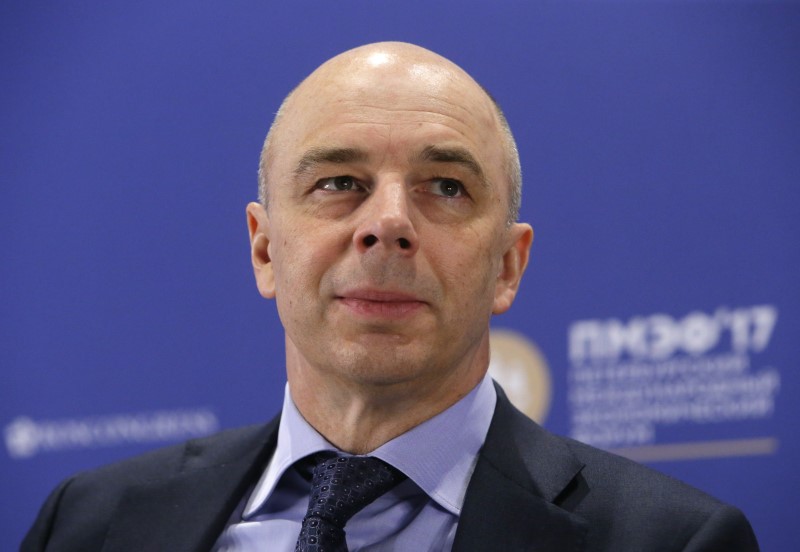By Darya Korsunskaya and Andrey Ostroukh
MOSCOW (Reuters) - Russia's finance ministry will focus on squeezing more tax revenue from the domestic economy as it believes it can not borrow more from foreign investors, Finance Minister Anton Siluanov said.
Although it aims to bring the budget deficit toward zero in the next few years, the finance ministry nearly doubled borrowing this year to compensate for shortfall in incomes from oil exports and a stalled sale of state stakes in Russia's major companies.
In an interview with Reuters, Siluanov said it would be difficult to expand its borrowing plan from the 1 trillion rubles ($16.55 billion) approved for this year.
The finance ministry had enjoyed strong demand for its treasury bonds, known as OFZs, as foreign investors piled into Russian debt for carry trades - borrowing dollars cheaply, converting them into the firming rouble, and then buying high-yielding Russian bonds.
But as the Bank of Russia started cutting rates this year, while the U.S. Fed increased its own rate, returns from OFZ ownership became less lucrative, especially after the rouble pared gains and risks of new western sanctions increased.
Siluanov acknowledged foreign appetite for OFZ bonds had faded recently.
But even if new U.S. sanctions are imposed on Moscow, a "large exodus" of non-residents from state bonds is unlikely, Siluanov said, as the OFZs were mainly purchased by major investors and pensions funds that do not use these instruments for short-term market speculation.
The U.S. Senate voted overwhelmingly in June for new sanctions on Russia to punish it for alleged meddling in the 2016 U.S. election, an allegation that Russia dismisses. The new sanctions have not yet been passed by the House of Representatives, but analysts have expressed concerns that it could include restrictions on buying OFZs.
While the finance ministry may struggle to sell more OFZs to foreigners, who owned 30 percent of such bonds in early June, the finance ministry can not count on domestic money either.
"It would be difficult to rely solely on internal investors without raising borrowing costs," Siluanov said.
The finance ministry is also struggling to plug holes in the budget by selling state companies to private investors. Moscow is not willing to sell such stakes cheaply, blaming Western sanctions for adverse market conditions.
"If there were no such limitations, sanctions, if companies' valuation were not clearly underrated, then the privatization would go on more actively," Siluanov said.
"That is why we need a lower budget deficit: no wide-scale privatization is planned, we won't borrow much on external market, and moreover an extra inflow of foreign currency could lead to the rouble firming," he said.
A weaker rouble would help the finance ministry, which receives around half of its budget revenues from selling oil and gas abroad for dollars, to fund social liabilities ahead of 2018 presidential elections.
TAX COLLECTION
While seeing a need to adjust taxation in the oil-dependent economy, the finance ministry does not support an idea of tax breaks for oil companies that run mature oil fields, producing less and less crude, Siluanov said.
Siluanov said tax breaks on most depleted fields may deprive the budget of 130 billion rubles ($2.17 billion) a year.
Rosneft, Russia's influential oil giant, had earlier asked to lift taxes on Samotlor, a field that was responsible for over a quarter of the Soviet Union's production but later became depleted with extraction affected by heavy water levels.
For now, the finance ministry will put an emphasis on better tax collection, as it does not expect prices for oil, Russia's key exports, to rise above $60 per barrel in the foreseeable future, Siluanov said.
"We would use all our arsenal to fight against those who evade taxes this and next year," Siluanov said.
Stronger tax collection and a prudent fiscal policy are tactics designed to shield Russia from external shocks that in 2014, when Moscow annexed Crimea, battered the rouble and paved the road for two years of economic recession.
"If we want to secure our liabilities from external factors, we need to be realistic in assessing macroparameters, including prices for our export goods," Siluanov said, referring to uncertainty around the OPEC oil-cut production agreement and prospects of shale extraction in the United States.
